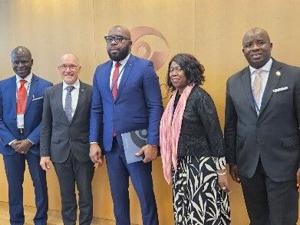Kenya, Tanzania strengthen cooperation to protect Mara basin
The Mara River basin stakeholders have reaffirmed their commitment to preserving the Mara ecosystem, recognizing it as a symbol of their shared natural heritage.
During the 13th Mara Day celebrations held in Sekenani, Narok West Sub County, speakers highlighted the critical importance of the Mara River and its basin, which flows through both Kenya and Tanzania, as a lifeline for millions of people and wildlife.
Principal Secretary for the State Department of East African Community, Abdi Dubat, representing Cabinet Secretary Beatrice Askul, emphasized that the Mara River basin is home to millions of wild animals, including the globally renowned wildebeest migration.
He pointed out that the natural resource significantly contributes to tourism, provides vital ecosystem services, and enriches the cultures of the communities living within the basin.
“The river originates from the Mau escarpment and flows 395 kilometres, passing through the Maasai Mara National Reserve and Serengeti before draining into Lake Victoria,” Dubat said.
Despite its vital role, the PS expressed concern about the threats posed by climate change, human activities, and environmental degradation in the Mara basin.
He stressed the need for continued cooperation between Kenya and Tanzania to ensure the sustainable management and conservation of this shared resource.
“Our joint commitment to protecting the Mara River basin is not only a duty but a legacy we must preserve for future generations,” he added.
Dubat also reiterated the Kenyan government’s pledge to plant 15 billion trees over the next decade as part of efforts to combat environmental degradation and strengthen the ecosystem’s resilience.
He emphasized that rejuvenating forests and landscapes will secure a sustainable future for rivers, wildlife, and livelihoods, aligning with the government’s Bottom-Up Economic Transformation Agenda.
The PS praised the cooperation among East African nations, reflecting the true spirit of regional unity through shared resources.
He encouraged further joint initiatives, research collaborations, and shared policies to protect the Mara River and its ecosystem for posterity.
East Africa Legislative Assembly (EALA) Member of Parliament David Sankok echoed the call for unity in conserving the Mara River, stressing that working together will ensure the river continues to nurture life and inspire future generations.
Lake Victoria Basin Executive Secretary Dr Masinde Bwire called for continued collaboration between Kenya, Tanzania, and Uganda on environmental conservation, highlighting the importance of transboundary efforts.
Narok Deputy Governor Tamalinye Koech, representing Governor Patrick Ntutu, emphasized the significance of the Mara basin as a tourism hub and urged stakeholders to preserve the ecosystem for future generations.
He praised the ongoing cooperation to protect the iconic ecosystem, home to the world-famous wildebeest migration.
Other notable attendees included Narok Governor’s wife Agnes Ntutu, Maasai Mara University Vice-Chancellor Professor Peninah Aloo, and delegates from Tanzania, Uganda, and several Kenyan counties, including Nakuru, Bomet, Kericho, and Kisumu.
This year’s Mara Day theme, ‘Flowing Forward Together: Conserving the Mara Basin for Biodiversity and Climate Resilience’, underscored the importance of joint conservation efforts.
The Maasai Mara National Reserve, home to millions of species and a major tourism attraction earns Narok County over KSh 3.5 billion annually, highlighting its importance as both a natural and economic resource.
The post Kenya, Tanzania strengthen cooperation to protect Mara basin first appeared on KBC.
The post Kenya, Tanzania strengthen cooperation to protect Mara basin appeared first on KBC.






